What are the bad effects of overloading a fire pump?
Apr 14, 2023
Share:
Overloading a fire pump can have a variety of negative effects, both short-term and long-term. Fire pumps are an essential component of a fire protection system and are designed to provide a steady, reliable source of pressurized water to the fire sprinkler system. When a fire pump is overloaded, it can cause a variety of problems, such as decreased water pressure, decreased system effectiveness, and even system failure.
The most immediate and serious effect of overloading a fire pump is a decrease in water pressure. When the fire pump is overloaded, it is unable to deliver enough water to the system, resulting in a decrease in water pressure. This decrease in water pressure can result in a decrease in the effectiveness of the sprinkler system and can even lead to system failure in extreme cases.
Another bad effect of overloading a fire pump is that it can cause damage to the components of the fire protection system. If the fire pump is overloaded, it can cause too much strain on the components of the system, leading to premature wear and tear or even complete failure of the components. Overloading a fire pump can also cause the system to become clogged, leading to decreased water pressure and decreased system effectiveness.
Overloading a fire pump can also have long-term effects, such as increasing the risk of fire. When a fire pump is overloaded, the water pressure in the system can decrease, leading to a decrease in the effectiveness of the sprinkler system. This decrease in effectiveness can lead to a decrease in the ability of the system to extinguish fires in a timely manner, increasing the risk of fire.
In conclusion, overloading a fire pump can have a variety of negative effects, both short-term and long-term. These effects include decreased water pressure, decreased system effectiveness, damage to the components of the system, and increased risk of fire. It is important to ensure that fire pumps are not overloaded in order to ensure the effectiveness of the fire protection system.

The most immediate and serious effect of overloading a fire pump is a decrease in water pressure. When the fire pump is overloaded, it is unable to deliver enough water to the system, resulting in a decrease in water pressure. This decrease in water pressure can result in a decrease in the effectiveness of the sprinkler system and can even lead to system failure in extreme cases.
Another bad effect of overloading a fire pump is that it can cause damage to the components of the fire protection system. If the fire pump is overloaded, it can cause too much strain on the components of the system, leading to premature wear and tear or even complete failure of the components. Overloading a fire pump can also cause the system to become clogged, leading to decreased water pressure and decreased system effectiveness.
Overloading a fire pump can also have long-term effects, such as increasing the risk of fire. When a fire pump is overloaded, the water pressure in the system can decrease, leading to a decrease in the effectiveness of the sprinkler system. This decrease in effectiveness can lead to a decrease in the ability of the system to extinguish fires in a timely manner, increasing the risk of fire.
In conclusion, overloading a fire pump can have a variety of negative effects, both short-term and long-term. These effects include decreased water pressure, decreased system effectiveness, damage to the components of the system, and increased risk of fire. It is important to ensure that fire pumps are not overloaded in order to ensure the effectiveness of the fire protection system.


.png)
.png)

.png)


